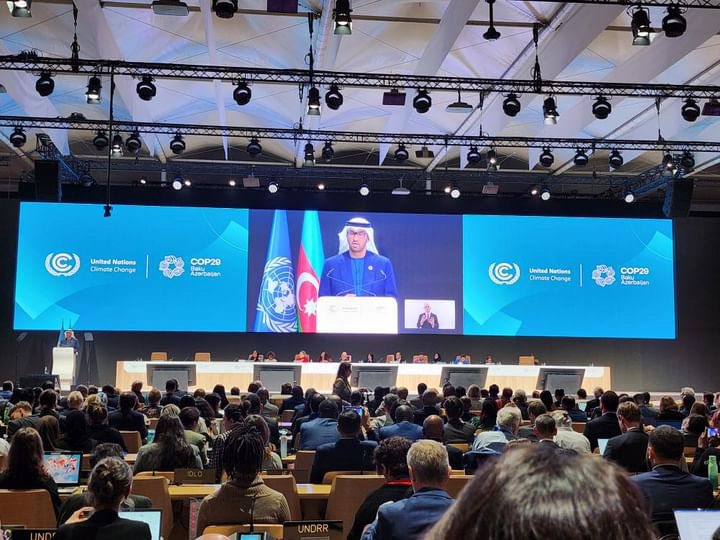COP29: A Controversial Summit in Baku with Divides and Tensions
- Cherry Sung
- Nov 24, 2024
- 4 min read
The 29th United Nations Climate Change Conference (COP29) concluded in Baku, Azerbaijan, after two weeks of intense and often contentious negotiations. While the summit was billed as a critical moment for climate action, it ended with an outcome that left many feeling that global leaders missed the mark on addressing the urgent needs of the climate crisis. The focus of COP29 was on climate finance, particularly the commitment of wealthy nations to support developing countries in their efforts to mitigate and adapt to climate change. But despite the high stakes, the agreement reached has been deeply divisive, and the summit was mired in political controversy from the start.
Below are photos from our representative attending the conference in person:
Climate Finance: A Deal That Falls Short
At the heart of COP29’s discussions was the New Collective Quantified Goal (NCQG) on Climate Finance, which sought to address the financial gap between what wealthy nations are willing to contribute and what developing countries need to combat climate change. The agreement that emerged from the summit saw rich countries agreeing to provide “at least” $300 billion annually for climate action in developing nations. While this may sound like a significant commitment, it is far below the estimated $1.3 trillion per year that scientists and activists say is necessary to avoid the worst impacts of climate change.
The financial pledge was a point of sharp division throughout the summit. Developed nations argued that the remaining funding should come from other sources, such as private sector investments and new taxes, rather than additional government spending. However, many developing nations and climate activists saw this as a failure to hold the richest countries accountable for their role in causing the climate crisis. They argued that without sufficient public funding, the resources needed to help the world’s poorest countries—who are most vulnerable to climate impacts—will remain insufficient.
As negotiators struggled over the details of the deal, tensions escalated between the Global North and South, with many representatives from developing countries condemning the agreement as inadequate. For them, the $300 billion pledged is nowhere near enough to address the scale of the crisis. And for many, the financial commitments made at COP29 reflect the ongoing imbalance in global climate finance—a gap that has been a source of contention for years.
Controversies Before and During the Conference
COP29 faced additional scrutiny due to the choice of Azerbaijan as the host country. Azerbaijan’s record on human rights, particularly in relation to environmental activism, has raised alarm among climate groups. Several reports and investigations, including from BBC Korea, pointed to the suppression of environmental activists in the country.
As if the financial divides weren’t enough, the political atmosphere surrounding COP29 became even more volatile after Azerbaijani President Ilham Aliyev made controversial remarks about France’s colonial history. Aliyev lambasted France for its so-called colonial “crimes” in its overseas territories, accusing European nations of corruption while lecturing others on human rights. Specifically, he pointed to the violent crackdown in New Caledonia, a French overseas territory, as evidence of hypocrisy.
These remarks caused an immediate diplomatic stir, leading to the withdrawal of high-profile nations, including France and Argentina, from the summit. Their decision to leave in protest underscored the deep political rifts that were threatening to overshadow the climate discussions. The fallout highlighted the difficulty of holding a global climate summit in a country where political tensions and accusations of human rights abuses are so pronounced.
Youth Representation: A Missed Opportunity
Another area of criticism for COP29 was the limited representation of youth activists. Young people have been at the forefront of the climate movement, leading global protests and demanding action from world leaders. However, many observers felt that COP29 failed to provide adequate space for youth voices in the official discussions. Though there were some youth delegates present, including the International Organization for Migration's (IOM) Youth Delegates on Climate Migration, many young activists expressed frustration at their lack of influence in the decision-making processes.
The absence of youth perspectives is particularly concerning given that young people will be the ones most impacted by the long-term effects of climate change. The exclusion of their voices at a summit like COP29 only reinforces the feeling among many youth activists that global climate discussions are being driven by the same elites who have failed to act with the urgency required. The summit’s failure to fully integrate young people into the decision-making process represents a missed opportunity to truly engage those who are often leading the charge for climate justice.
The Road Ahead
COP29 may be over, but the debate it sparked is far from finished. The final agreement on climate finance may have been a small step forward, but it leaves many questions unanswered, especially regarding the fairness and adequacy of the funding committed. COP29 serves as a reminder of the complex, multifaceted nature of the climate crisis. The financial, political, and social challenges of addressing climate change require urgent and united action, but the divisions on display at this summit suggest that the road ahead will be anything but smooth.
References























